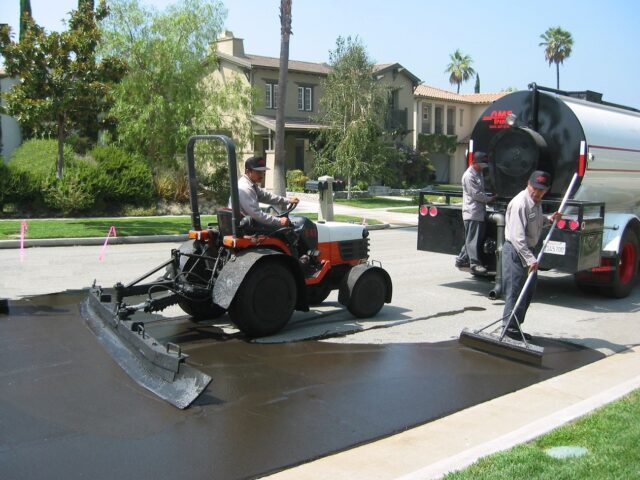
What is it?
Seal coat is a thin liquid layer applied to the surface of worn or freshly installed asphalt for the purpose of protecting the asphalt, extending its life, and enhancing its aesthetic appeal. Consisting of refined coal tar with water, emulsifying agents, and additives; seal coat provides a layer of protection from asphalt-damaging agents such as UV rays, oils, pollutants, and water.
Science fact: Since seal coat and asphalt are both petroleum-based products, they bind on a molecular level to strengthen one another and are virtually inseparable once bonded.
Why is it important?
Think of asphalt as you would the siding on a house. Much like a home, asphalt is not a cheap investment to be worn through and replaced quickly. You want to protect and prolong the life of your investment for as long as possible. In this scenario, seal coat is your weather-proof paint. Just like a solid coat or two of good paint can protect your siding from the sun, rain, chemicals, and pollutants; seal coat can protect asphalt from the same. It also evens out rough spots and gives an overall smoother appearance. And, as you can imagine, it’s significantly less expensive to “repaint a house” than it is to “replace all the siding.” It also doesn’t hurt that a fresh coat of paint just looks better.
The analogy doesn’t end there. Like paint, seal coat also has its limits. If there are chunks and sections of the siding that are missing or completely falling apart, paint is essentially useless – same goes for seal coat on failing asphalt. Failing asphalt includes extensive cracking (which can resemble alligator skin), severe raveling (the loss of aggregate), and base failure (resulting in low spots, potholes, or sinkholes).
When do I need to do it?
Industry experts recommend that asphalt surfaces be sealed every 3 to 4 years depending on weather conditions, wear and tear, and usage. Areas that receive heavy snowfall, extreme heat, or high/heavy traffic are more susceptible to damage than a nicely shaded street in a quiet neighborhood in a moderate temperature zone, so it’s important to be aware of the conditions that may affect your asphalt. If you’re noticing small cracks or rough patches here and there, it might be time to do some crack sealing and seal coating before things get worse and asphalt becomes damaged beyond what a seal coat can fix.
Not sure if you need it? Give us a call. We’ll send out an experienced Estimator to survey your property and make recommendations. Whether it be for immediate action, or to start setting up a strategy to help you budget and plan for future work, we’ll be there to help with your decision.
